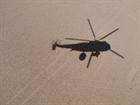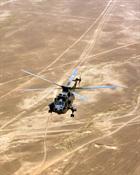Royal Navy Sea Kings mark five years of success in Afghan skies
Article from Navy News
More than 40 tonnes of drugs, 170 tonnes of home-made bombs and 150 insurgents have been seized thanks to the Royal Navy’s eyes in the skies of Afghanistan.
Since arriving at Camp Bastion five years ago last month, the veteran helicopters have completed 2,000 sorties and 9,000 hours – the equivalent of 375 days – flying over Afghanistan.
In five years of unbroken commitment to the Allied cause on the ground, Sea Kings of the Airborne Surveillance and Control force – normally based at RNAS Culdrose in Cornwall – have played a key role in locating insurgents’ arms caches, tracking drugs shipments and following the movements of insurgents.
The helicopters – dubbed ‘cloudwalkers’ by Afghans – were originally designed to provide Royal Navy task groups with early warning of air attack.
But their powerful radar has proved to be just as potent over land, with aircrew able to follow movements on the ground – directing Allied troops and security forces to make arrests and seizures.
Since arriving at Camp Bastion five years ago last month, the veteran helicopters have completed 2,000 sorties and 9,000 hours – the equivalent of 375 days – flying over Afghanistan.
In doing so, they have helped with the capture of
- 150 insurgents
- 40,000kg of drugs (40 tons)
- 172,000kg of ammonium nitrate used in home-made bombs (169 tons)
- 3,000kg of home-made explosives (3 tons)
- 4,500kg of weapons (4½ tons)
- 50 Rocket Propelled Grenades
- 40 AK47 rifles
- 20,000 rounds of ammunition
Commander Andrew Rose, the Royal Navy’s Maritime Sea King Force Commander, said his personnel could look back on the milestone “with immense professional pride and a personal sense of a job well done”.
He continued: “The men and women of the Sea King Force have delivered on operations in the unforgiving environment of Helmand and have conducted themselves in the finest traditions of the Fleet Air Arm.
“There were those who thought that a maritime force would be unable to cope with the rigours of land operations.
“If I compare my first visit to Camp Bastion in 2009 to May this year, we’ve come a long way – and the reputation of the force has grown across the Coalition.
“Our flexibility, professionalism and can-do attitude has delivered a quality product which has had an impact on the campaign. It’s contributed to the security and stability of the Afghan people and – as a small part of the overall UK effort – protected our national security by helping Afghanistan take control of its.”
857 NAS have just handed over to their sister 854 after a 26-month ‘watch’ when it flew 3,000 hours during 800 front-line missions.
Lt Cdr James Hall, 857’s Commanding Officer, said the dedication and commitment to the mission shown by the squadron was as strong in May 2014 as it was when the first Baggers arrived in Afghanistan in May 2009 – as was the support of “unsung heroes” back in the UK.
“Throughout the time we’ve been operating in Afghanistan there has been an essential role played by our families and friends back in the UK,” he said.
“They’ve seen their loved ones spend a considerable time away from home and without this ‘back stage’ support the task would have been much more difficult for those personnel who have been deployed.”
Ground crews worked in temperatures of 55°C at the height of summer, while 8,000ft above the Hindu Kush it was as cold as -15°C for the aircrew.
For every hour in the Afghan skies, the Sea King requires 30 ‘man hours’ on the ground from engineers toiling by day and night.
“Maintaining Sea Kings which first saw active service in the Falklands is a continual challenge,” said WO2(AET) Neil Copeland, 857 Squadron’s senior maintainer.
“The engineers work 24/7, despite scorching summer temperatures and freezing cold winter nights to ensure the helicopters remain available. It’s a mammoth effort, but it’s done in a most proficient manner – and with passion.”
With the British presence in Helmand reducing, the Baggers’ role there is under review as the force looks to return to its maritime roots.







